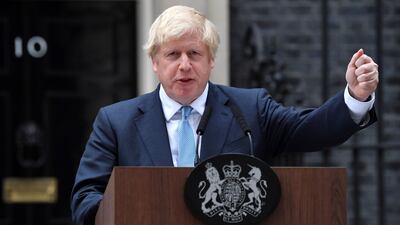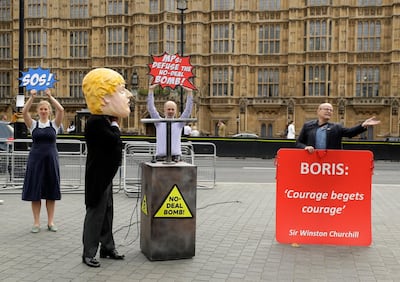The UK and the European Union are engaged in a giant game of geopolitical chicken. What will happen next? Who will swerve? Will British Prime Minister Boris Johnson get a deal out of the EU or are we heading for a no-deal collision?
Just over 40 days ago, before Mr Johnson was elected, the Conservative Party faced an existential crisis. It had become the party for leaving the EU that was rubbish at leaving the EU. The Gordian knot of Brexit remained intact. The Conservatives polled less than 10 per cent in a national election. People were growing tired of Brexit, just wanting it done. The prospect of no Brexit at all looked very real.
His predecessors wouldn't or couldn't pull it off. So can Mr Johnson "get Brexit done"? Some would say no. To mangle Winston Churchill's famous words, never in the course of human organisation has so little been thought, by so many, about so few. With a reputation as a gaffe-prone buffoon, in the minds of many a foe, the bar for expectations of success was set low.
As someone who has been in the thick of it on the campaign trail with him, I believe Mr Johnson is about to embark on another triumph-over-adversity journey, akin to his victory over Ken Livingstone in the London mayoral election in 2008. I think he will revisit a well-trodden narrative arc to succeed in spite of the circumstances, break the Brexit stalemate and stop the can-kicking Conservatives from kicking the bucket.
You might not agree with me. Many wiser people than me won't. And he certainly isn't everyone's cup of tea. It might go horribly wrong. But I don't think it will – and this is why. It is all about the person, the people and the plan.
The task requires a leader who is persuasive, compelling and energised. A leader’s public performance matters and Mr Johnson is on form.

Mr Johnson knows he cannot do it all on his own and his use of persuaders like political strategist Lynton Crosby, fresh from the election victory of Scott Morrison in Australia in May, and Dominic Cummings, the architect of Vote Leave, shows the importance the prime minister places on his team.
Mr Johnson’s strategy, much like him, is an enigma: bold, unpredictable, energised, often confusing and ever controversial. This approach owes much to an understanding of game theory, Mr Cummings – a follower and admirer of US colonel and military strategist John Boyd, credited with devising the 1991 Gulf War plans to liberate Kuwait – as well as his natural tendency to go off-piste.
Students of game theory, or fans of Dr Strangelove, know you need to make sure the other side knows you have a Doomsday machine if you want to win. Or in this case, that you will leave with no deal. Ramping up no-deal plans, not appointing a new EU commissioner and the controversial restricting of time to debate Brexit by proroguing Parliament signal seriousness.
Students of the late Boyd know that war, like politics, is a battle for people’s minds. Boyd’s manoeuvre warfare approach applied the use of multiple thrusts, feints and decoys delivered unpredictably and at speed to overwhelm and confuse opponents. Compared to his highly predictable predecessor Theresa May, Mr Johnson is moving at breakneck speed in multiple directions, causing consternation and eliciting reaction to his approach, as threats of legal action from the former prime minister Sir John Major show.
Despite recent resignation setbacks from the likes of Scottish Conservative leader Ruth Davidson, his approach is winning back supporters. Polls show a Boris bounce. A recent YouGov poll gave the Conservatives an 11-point lead over Labour.
Manoeuvres such as making promises to ditch austerity, champion the NHS, commit to infrastructure projects, safeguard EU citizens’ rights and make it easier for the world’s best and brightest to come to the UK have altered the context of political debate.
Mr Johnson has reduced opponents' credible options in parliament. Confidence votes, a general election (that he might win or that could deliver a no-deal by default) and the Labour opposition taking power are not enticing options for MPs. Changing the law with reduced parliamentary time will be a more difficult task.
And Westminster political opponents have committed fully to attacking no deal, a move that could later see them encircled and forced to back a Boris-brokered deal with Brussels.
So what does all this mean for the Middle East? Much depends on how the UK leaves the EU, but the UK has strong historical connections across the region – connections which even EU officials have admitted stand to grow stronger, whatever challenges lie ahead. As the UK seeks to make Brexit a success, there is likely to be a significant push for investment from GCC countries.
Trade between the UK and the Middle East is substantial. Since 2010 Oman has been the UK’s fastest growing export market. The UAE itself accounted for 3.7 per cent of UK exports to non-EU countries last year. The UAE and the UK are aiming to secure bilateral trade deals worth about Dh120 billion by next year, made possible, in large part, by the thousands of British businesses and Brits who call the UAE home. Mr Johnson will undoubtedly be hoping the UK can benefit from the goodwill he built in supporting the UAE’s successful bid to host World Expo 2020 in Dubai when he was mayor of London.
So what will happen next? Who will swerve? That all remains to be seen but Brexit looks distinctly possible again – deal or no deal.
Peter Bellini is a former Conservative Party campaign director and worked on the 2008 Boris Johnson London mayoral campaign. He is currently a senior strategic communications industry professional in the Middle East


